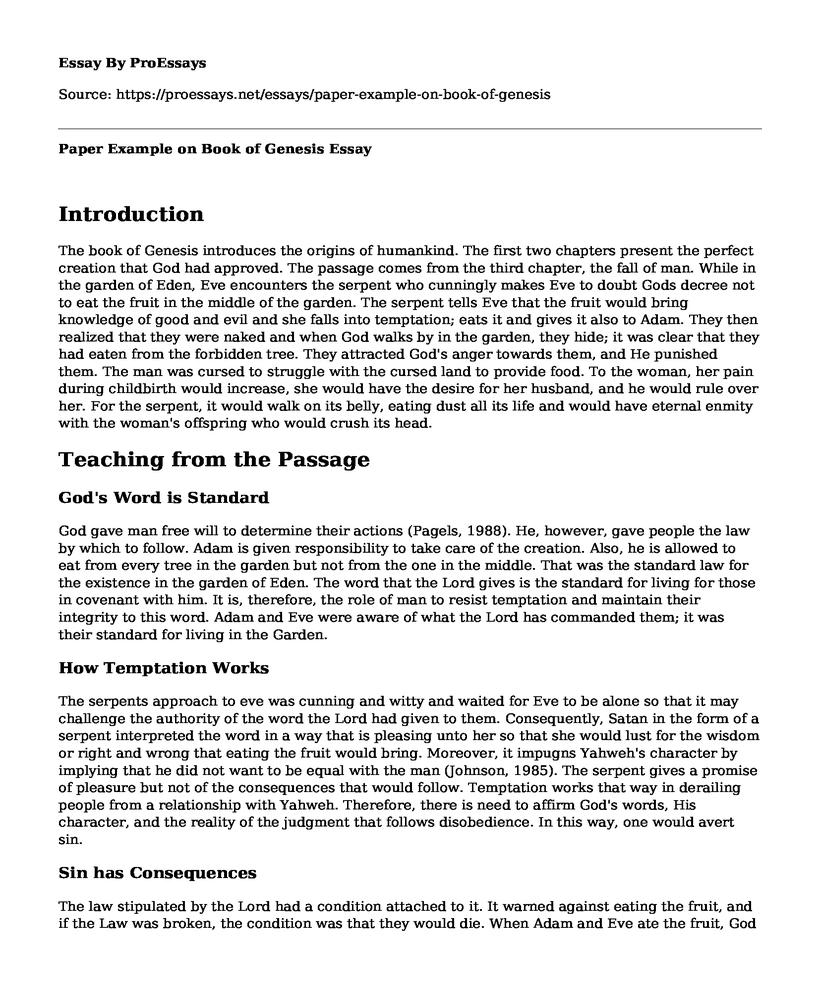Introduction
The book of Genesis introduces the origins of humankind. The first two chapters present the perfect creation that God had approved. The passage comes from the third chapter, the fall of man. While in the garden of Eden, Eve encounters the serpent who cunningly makes Eve to doubt Gods decree not to eat the fruit in the middle of the garden. The serpent tells Eve that the fruit would bring knowledge of good and evil and she falls into temptation; eats it and gives it also to Adam. They then realized that they were naked and when God walks by in the garden, they hide; it was clear that they had eaten from the forbidden tree. They attracted God's anger towards them, and He punished them. The man was cursed to struggle with the cursed land to provide food. To the woman, her pain during childbirth would increase, she would have the desire for her husband, and he would rule over her. For the serpent, it would walk on its belly, eating dust all its life and would have eternal enmity with the woman's offspring who would crush its head.
Teaching from the Passage
God's Word is Standard
God gave man free will to determine their actions (Pagels, 1988). He, however, gave people the law by which to follow. Adam is given responsibility to take care of the creation. Also, he is allowed to eat from every tree in the garden but not from the one in the middle. That was the standard law for the existence in the garden of Eden. The word that the Lord gives is the standard for living for those in covenant with him. It is, therefore, the role of man to resist temptation and maintain their integrity to this word. Adam and Eve were aware of what the Lord has commanded them; it was their standard for living in the Garden.
How Temptation Works
The serpents approach to eve was cunning and witty and waited for Eve to be alone so that it may challenge the authority of the word the Lord had given to them. Consequently, Satan in the form of a serpent interpreted the word in a way that is pleasing unto her so that she would lust for the wisdom or right and wrong that eating the fruit would bring. Moreover, it impugns Yahweh's character by implying that he did not want to be equal with the man (Johnson, 1985). The serpent gives a promise of pleasure but not of the consequences that would follow. Temptation works that way in derailing people from a relationship with Yahweh. Therefore, there is need to affirm God's words, His character, and the reality of the judgment that follows disobedience. In this way, one would avert sin.
Sin has Consequences
The law stipulated by the Lord had a condition attached to it. It warned against eating the fruit, and if the Law was broken, the condition was that they would die. When Adam and Eve ate the fruit, God was angry, and each of them faced their consequences. The human suffering today is credited to the sin of Adam and Eve. Because of them, there is suffering and corruptness of the human race (Anderson, 2002). They all went against the commands of Yahweh, and they faced the consequences. Ultimately, they were chased from the garden of Eden and as per the condition of the law, they died spiritually. For every Christian therefore, committing actions against the commands of the lord have their wages.
Conclusion
The passage introduces the origins of sin; from the fall of man. The serpent deceives man into disobeying God's commands with the allure of wisdom and knowledge. They fall and invite Gods anger that results to terrible consequences. The passage is helpful in deriving useful lessons for the Christians. There is need to accept God's word as standard, avoid temptation and avoid sin as it brings consequences.
References
Anderson, G. A. (2002). The genesis of perfection: Adam and Eve in Jewish and Christian imagination. Westminster John Knox Press.
Bible, H., & Version, N. K. J. (1982). Nashville. TN: Thomas Nelson.
Johnson, M. D. (1985). Life of Adam and Eve. The Old Testament Pseudepigrapha, 2, 249-95.
Pagels, E. H. (1988). Adam, Eve, and the serpent. Vintage.
Cite this page
Paper Example on Book of Genesis. (2022, May 22). Retrieved from https://proessays.net/essays/paper-example-on-book-of-genesis
If you are the original author of this essay and no longer wish to have it published on the ProEssays website, please click below to request its removal:
- The Eucharist Sacrament, Sign, and Symbols Essay
- History of Christianity in Hui Research
- Old Testament Essay Example
- Rizal's Retraction Essay Example
- Essay Example on Jesus Mission: Teach, Criticize & Sacrifice for Humankind
- Essay Example on God's Warning to His People: Jeremiah's Prophecy
- Paper Example on Understanding Worldviews: A Historical Perspective







